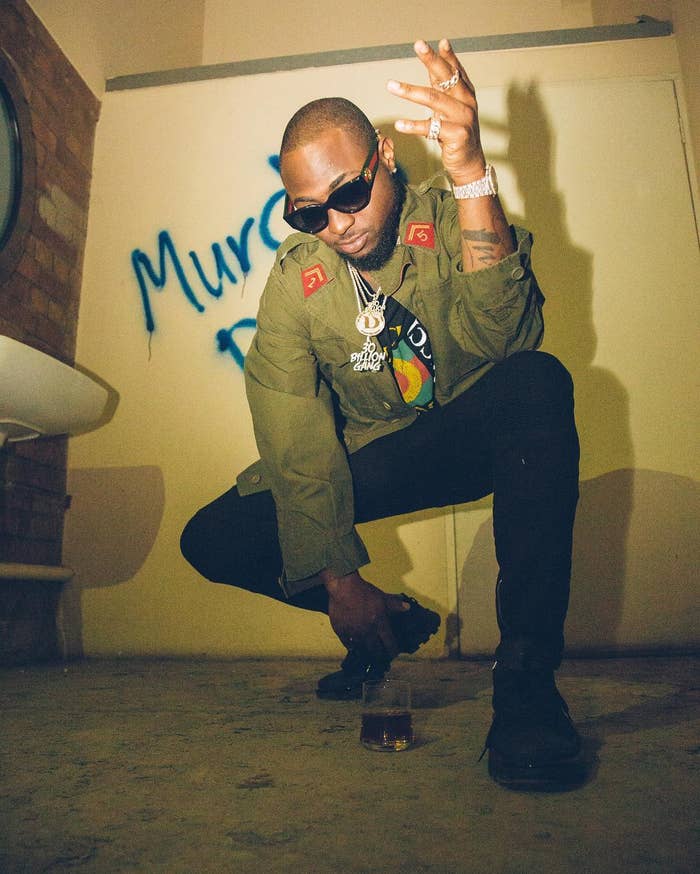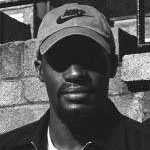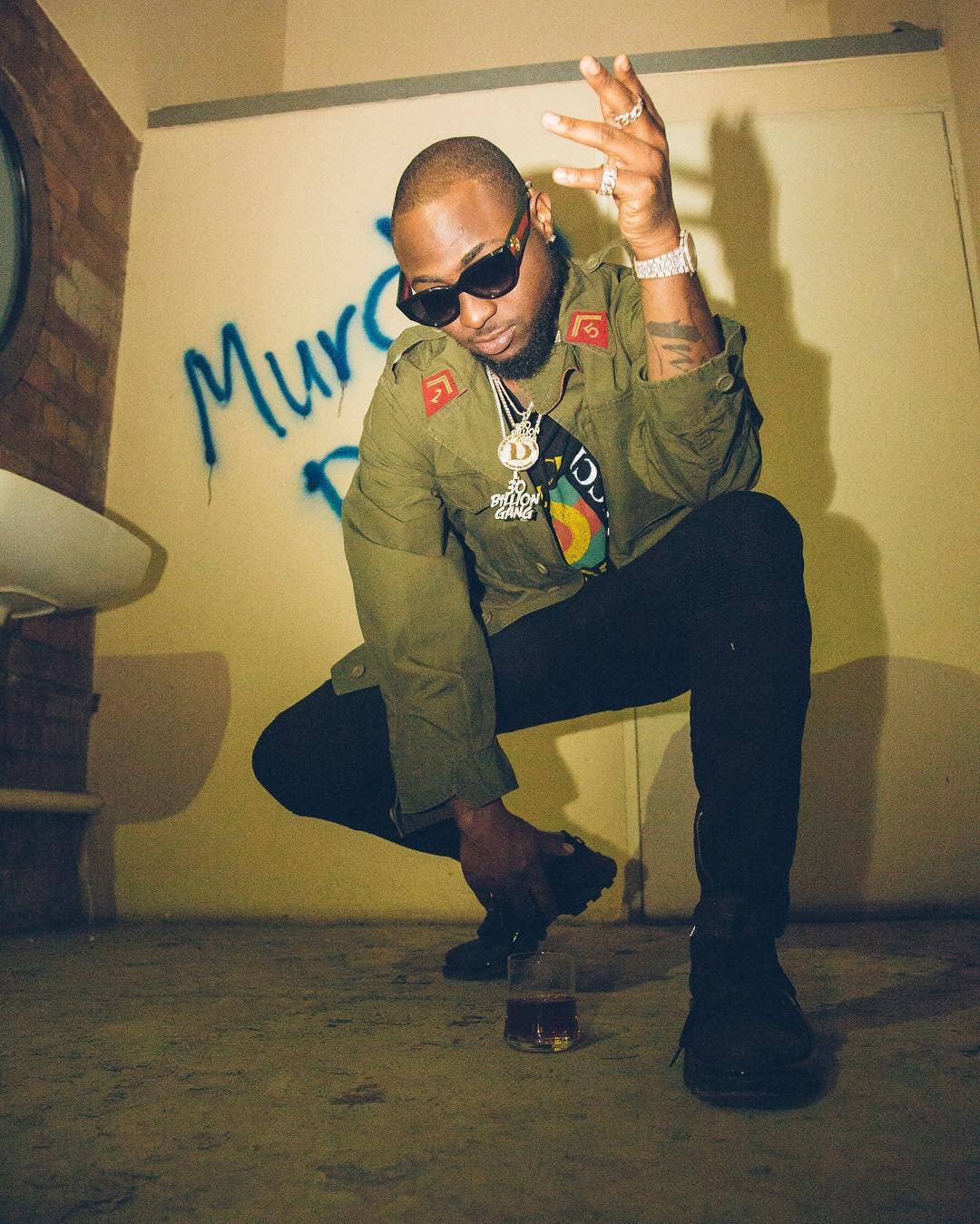
It would have been completely understandable if Davido wasn’t able to turn up to our interview, but when he does arrive, he’s tired, but full of joy—his wife gave birth to his third child just this weekend gone, and he had arrived in Kensington after being at the hospital. The artist considers himself blessed as it was the first of his children whose birth he was able to be at the hospital for. He was also adamant in wanting to wait for his wife to give birth before he released A Good Time, his second studio album.
It’s been a long time coming—especially since he dropped his first album, Omo Baba Olowo, in 2012—but all the planets have aligned and, for Davido, the timing is nothing short of poignant. Over the past few years, he’s rapidly become one of the leading pop artists coming out of Nigeria, with a string of hits such as “Fall”, “FIA”, and “If”. What’s made Davido’s rise even more significant is the fact that he was born in Atlanta, went to university there, and is currently based there. And while he’s representative of the ground that’s been broken in American music, even with A Good Time set to do the rounds, Davido understands that there’s more work to be done.
Reflecting on the days when he first messed with music in university, Davido never imagined being where he is now, at 26. He’s always said that he wants to retire at 30, but the hunger that’s brought him to this point doesn’t look like it’ll be disappearing any time soon. Nigerian pop is in its bag right now—and Davido’s eyes are focused on the present. Plus, with the momentum he’s built with just one EP and one album in the past seven years, he’ll be on heavy rotation for years to come. However, the work he’s doing now is to leave a template for the next gen to follow, like his forebears before him.
By the time Davido hits 30, he wants to be remembered as a helper and, by holding the door open behind him, he’s heading in the right direction.
COMPLEX: Congrats on the birth of your new child! How does it feel?
Davido: It’s my third child but my first son, so it’s a crazy feeling. This was my first time being there in the hospital.
What was that experience like for you?
It was a crazy experience. I was able to see how strong my wife is, and the doctors were amazing! Most of the staff were African, so they were telling the doctors how important the baby is—it was a really special moment.
And the timing of it must’ve been surreal, considering you’re about to release a new album.
Funnily enough, everything regarding the album has been finished, more or less, because I said this album’s not dropping until my son comes. I knew that once the album dropped, I’d be everywhere and I wouldn’t have time, but I wanted my focus to be on the birth.
It’s been about seven years since the release of your debut album, so why did you choose this moment to drop your second one?
The album’s called A Good Time and we had that making the album. It’s also a good time for African music at the moment. I haven’t dropped an album in a long time—mostly singles—so it’s an important moment for me, especially with my son being here.
I’m trying to portray Nigeria in a way that isn’t always represented in the news.
When you first started out, did you ever see this moment happening?
I always knew that my music would be loved, but I didn’t think it would get this big—especially when I first started. One of my dreams was to have my video on TV in Nigeria, but when I was in school in Atlanta, I was playing D’Banj and P-Square and my friends loved it, but if they didn’t hear it, how would they find out about it? That’s why I’m grateful for today because there are so many ways we can put our music out there now. They’ve let us in a bit—not fully!—but we’re selling out arenas now. The numbers back home, they don’t have them over here and we’re talking about a market that’s one billion people.
A lot of that’s because of the way in which the continent’s never really been recognised as a creator of pop music.
Back home, most people that blow up are doing it for fun. With me, my first song I ever recorded was a joke; I wasn’t taking it seriously. The business aspect comes later in Nigeria, but it’s growing out big! Spotify isn’t available in Nigeria—most of my plays aren’t coming from there—but everyone back home still supports my stuff, so imagine if we did have Spotify? We’d outsell everyone!
Do you feel that it’s a good thing that Spotify isn’t available in Nigeria and that it’s important to have balance when it comes to music-listening?
It keeps it natural, but it’s 2019 and people need to get paid! There’s a lot more transparency in terms of who’s getting paid. It’s not perfect, but it’s better we do this than start going to do fraud. We may not have the best leaders, but when it comes to music, we’re the best in the world.
So, where’s home for you right now?
Home is Nigeria, but I’m not really there as much because music has taken us all over the world; every week, it’s taking us somewhere new. My main home right now is in Atlanta. I recorded most of my album there.
You were born in Atlanta, too, so how is it living back in your place of birth?
I’m a first generation entertainer in my family, so coming from both worlds and being Nigerian and American helped me to understand them. I understand how both sides work. I know that we’re both very keen on respect and values—it’s taught me to lean into both cultures. Funnily enough, I started as a rapper but that shit was not working. I was part of a group called KB Entertainment, and we almost signed a deal with Akon, but our shit didn’t blow. But I went back home and blew up there. I was in America trying to do hip-hop, so going home and doing my sound that felt natural was important.
That respect aspect is important, especially when wanting to understand both cultures.
I have a funny story about my guys from university. So my dad came into town, and when I introduced them to him, one of them went to shake his hand and he just looked at him. He didn’t know that, in our culture, we prostrate—but he wasn’t being rude or anything.
When D’Banj came and did his thing, that was all for what’s happening right now.
Do you see yourself as that bridge when it comes to Afrobeats and pop? Other artists have obviously come before you, but we’re talking about today, right now.
I think so, yeah, because I’m always trying to tell my people in both places what’s happening in the other and I’m doing that through music. I’m trying to portray Nigeria in a way that isn’t always represented in the news.
There’s always been a strong African presence in the US, but why do you think it’s taken so long for the music to stick over there?
I always like to say that London is Little Nigeria, but America is big—each city has its own culture—so it’s harder for foreign sounds to be heard out there. It had to be forced in, but a lot of artists started visiting Africa; I had Popcaan come down, and Lil Baby came as well. You had people coming to Nigeria for holidays and you had guys buying bottles but asking the bar to bring them out to Nigerian music. When I was in Atlanta, it was one of the first cities to start playing Nigerian music—especially in the strip clubs—so I was able to see it grow over the past few years. Over time, it just happened.
Did that mean a lot to you that Atlanta was one of the first to embrace it?
It did. Like I said, Atlanta was the first and then New York and, right now, it’s just flying.
It must feel pretty special being among other artists pushing the scene forward globally?
We’re fighting everyday to push this forward. There are those that came before us that fought to push it and this is the result. Us that are fighting now is for the next generation. When D’Banj came and did his thing, that was all for what’s happening right now. We’re setting up for the next generation.
And it’s important to pay homage to those that came before us.
Exactly! We’re just a grain in the hands of the creator, and I know that what’s happening didn’t just pop up. I remember when people were calling this thing “a phase”, but this thing has been here for years.
‘A Good Time’ is out on November 11.

